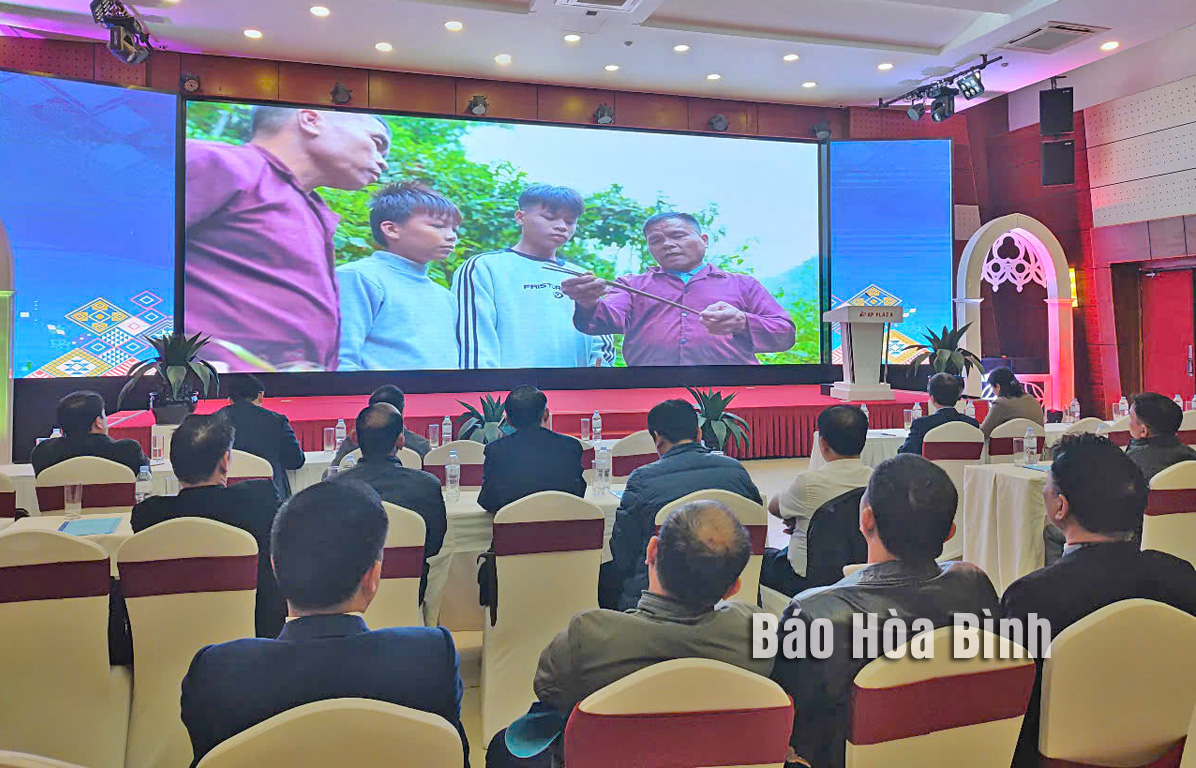
The provincial Department of Culture, Sports, and Tourism on December 24 organised a conference to report on the results of collecting, researching, restoring, and preserving "Bi doi”, a musical instrument of the airophonic family and a traditional instrument of the Muong ethnic people in Da Bac district.

Delegates watch documentary on the technique of
crafting and the art of performing "Bi doi” of the Muong people in Da Bac.
The delegates watched a documentary showcasing the results
of the "Bi doi" collection and documentation as well as the technique
of crafting and the art of performing the instrument.
"Bi doi” is a unique musical instrument of the Muong people
in Da Bac district who also refer to it as "Pi Toi” or "Pi Doi”. It is used
during festive occasions, celebrations, and Tet holidays, and in the
storytelling time after long hours of hard work. "Bi doi” has become an
indispensable instrument, embodying the spirit and essence of Muong ethnic
minorities.
In its efforts to preserve and promote the cultural heritage
of ethnic minorities in the province, the department has undertaken the
collection, research, and restoration of the methods for finding materials,
crafting, and teaching the instrument. The goal is to preserve and promote its
cultural value, while also developing tourism services, and fostering
socio-economic, and cultural development in the locality.
This effort is part of the project to preserve the cultural
heritage of the Muong ethnic group and the "Hoa Binh Civilisation,"
thus contributing to affirming the position, role, and profound significance of
traditional musical instruments in the cultural life of the group, and raise
awareness about the importance of preserving and promoting the "Bi doi” instrument.
At the conference, delegates from various departments,
agencies and the district, and artisans contributed their opinions on the
results of the collection and documentation of this instrument, as well as
measures to preserve and promote local cultural heritage.
The clothing of women reflects the culture of the Muong, Thai, Tay, Dao, and Mong ethnic groups in the northern province of Hoa Binh.
Gongs hold a special place in the cultural and spiritual life of the Muong ethnic people in Hoa Binh province. More than musical instruments, they are an indispensable part of community rituals and collective memory, echoing through generations as a spiritual thread linking the past, present, and future.
Preserving and promoting the cultural values of the Muong ethnic group has become an urgent task in the current context, as many traditional values face the risk of fading away. This effort requires not only protecting the cultural identity but also eliminating outdated customs and developing a modern cultural lifestyle, contributing to sustainable values for the Muong community in Hoa Binh province.
The Muong ethnic culture, deeply rooted in Vietnam’s mountainous north, continues to be preserved and revitalised by dedicated individuals and communities determined to safeguard their ancestral identity.
The Muong group is one of the largest ethnic minorities in Vietnam, primarily found in Hoa Binh province. The Muong people in Hoa Binh boast a rich and diverse cultural treasure that reflects the unique identity of this ethnic group. Accounting for over 63% of the province's population, they have created and preserved numerous distinctive cultural values, contributing to their unique identity. Their cultural heritage is an invaluable asset, at the heart of their national identity, and represents a vibrant spiritual life that must be preserved and promoted in today’s modern world.
For generations, the ethnic communities of Hoa Binh province, particularly the Muong people, have preserved vibrant festivals deeply intertwined with the region’s geography, nature, and social traditions. These celebrations enrich Hoa Binh’s spiritual life and cultural identity, reflecting both folk beliefs and the intermingling of ethnic customs. Many of these festivals have endured the test of time, passed down through generations and continuing to thrive today. Among them, the Khai Ha (Going Down to the Field) festival stands out as one of the most significant events of the Muong ethnic group.



